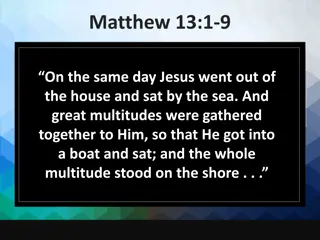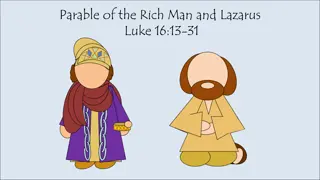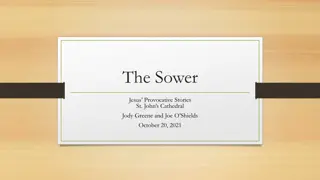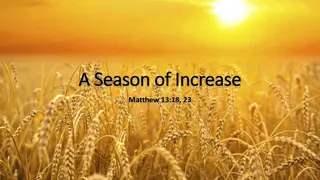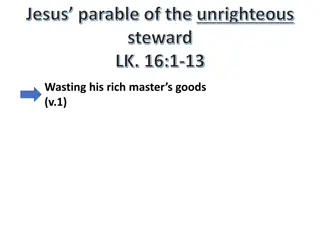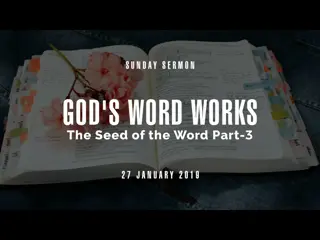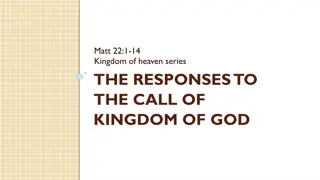
The Parable of the Sower in Mark 4:1-20
Explore the profound teachings of Jesus through the Parable of the Sower in Mark 4:1-20, delving into the reasons behind disbelief, the impact of Satan, and the significance of having a receptive heart to God's Word.
Download Presentation

Please find below an Image/Link to download the presentation.
The content on the website is provided AS IS for your information and personal use only. It may not be sold, licensed, or shared on other websites without obtaining consent from the author. If you encounter any issues during the download, it is possible that the publisher has removed the file from their server.
You are allowed to download the files provided on this website for personal or commercial use, subject to the condition that they are used lawfully. All files are the property of their respective owners.
The content on the website is provided AS IS for your information and personal use only. It may not be sold, licensed, or shared on other websites without obtaining consent from the author.
E N D
Presentation Transcript
Again Jesus began to teach by the lake. The crowd that gathered round him was so large that he got into a boat and sat in it out on the lake, while all the people were along the shore at the water s edge. He taught them many things by parables, and in his teaching said: Listen! A farmer went out to sow his seed. As he was scattering the seed, some fell along the path, and the birds came and ate it up. Some fell on rocky places, where it did not have much soil. It sprang up quickly, because the soil was shallow. But when the sun came up, the plants were scorched, and they withered because they had no root. Other seed fell among thorns, which grew up and choked the plants, so that they did not bear grain. Still other seed fell on good soil. It came up, grew and produced a crop, some multiplying thirty, some sixty, some a hundred times. Then Jesus said, Whoever has ears to hear, let them hear. When he was alone, the Twelve and the others around him asked him about the parables.11He told them, The secret of the kingdom of God has been given to you. But to those on the outside everything is said in parables. Mark 4:1-11 NIV
12so that, they may be ever seeing but never perceiving, and ever hearing but never understanding; otherwise they might turn and be forgiven. 13Then Jesus said to them, Don t you understand this parable? How then will you understand any parable?14The farmer sows the word.15Some people are like seed along the path, where the word is sown. As soon as they hear it, Satan comes and takes away the word that was sown in them.16Others, like seed sown on rocky places, hear the word and at once receive it with joy.17But since they have no root, they last only a short time. When trouble or persecution comes because of the word, they quickly fall away.18Still others, like seed sown among thorns, hear the word;19but the worries of this life, the deceitfulness of wealth and the desires for other things come in and choke the word, making it unfruitful.20Others, like seed sown on good soil, hear the word, accept it, and produce a crop some thirty, some sixty, some a hundred times what was sown. Mark 4:12-20 NIV
The Default of the Human Heart is to Reject Jesus Seeing but never perceiving, and ever hearing but never understanding (Mark 4:12). If God is real, why do so few people believe in Him. If Jesus is so good, why are there so few trusting in Jesus? This is a question that many of us have either asked or heard. What explains the lack of belief in God if He is so good? This is a question that people have asked for thousands of years and it is this question that lies behind this parable. Jesus has come in and has worked miracles and yet people are still opposing him. And It is striking that both bad times and good times can lead to rejection of Jesus and the Good News that he came to bring. In addition to our own sinfulness, there is also the work of Satan. Jesus says there are people who hear the Word, but as soon as they hear it, the Devil comes to steal the Word away. They never even respond to the Word because of the work of the Devil. The reason why people reject Jesus, therefore, is not because God is not good or He has not made Himself clear. It is not because we struggle to grasp it intellectually. It is not because the Gospel is not relevant enough. It is because we have hearts that are resistant to God.
The Preaching of Gods Word Guarantees Results Others, like seed sown on good soil, hear the word, accept it, and produce a crop some thirty, some sixty, some a hundred times what was sown (Mark 4:20). Despite the default state of people, this parable reminds us that as the Word is shared, there WILL be people who believe the Word. This is an amazing truth. Given the reality of human sin and the Devil, it would seem impossible that anyone would come to believe in Jesus. Jesus, however, in this parable guarantees that if the Gospel is preached, while there will be rejection, there will also be those who believe the Word. For those of us here who are Christians in this room, our trust in Jesus is evidence of this. Wherever the Gospel has been preached through the world there has been fruit. People have come to trust in Jesus. Here at Stockwell Baptist Church that ought to change how we see evangelism. Jesus guarantees that if we are faithful to share the Gospel, then it will bear fruit. How many doors are too many for 1 person to come to trust in Jesus?
The Purpose of Parables The secret of the kingdom of God has been given to you. But to those on the outside everything is said in parables (Mark 4:11). How then do we guarantee that we are the good soil? We sometimes hear that Jesus taught in parables in order to make things simple so that everyone could understand, but this is not what Jesus says. In one sense, Jesus says the opposite. He speaks in parables in order to make things less simple. And he does this so that we might understand our need for him to reveal himself to us. The Gospel here is called a secret and a secret is different from a puzzle. A puzzle can be figured out by someone who is really smart but a secret can t just be figured out. A secret needs to be revealed. And the Gospel must be revealed. We need God to reveal it. Notice that no- one understood the parable, including the disciples. But (v.10) those who admitted their need and came to Jesus were given . All who came to Jesus in humble dependence received the message of the Gospel. This creates humility. It means coming to Jesus is not something we can do in a cold and detached way. It is not something we can do while holding on to our pride. If we are trust in Jesus we must humbly ask him to teach us who he is. It is those who come to Him whose eyes are opened to see the truth of Jesus. To know Jesus, we are utterly dependent upon him.


